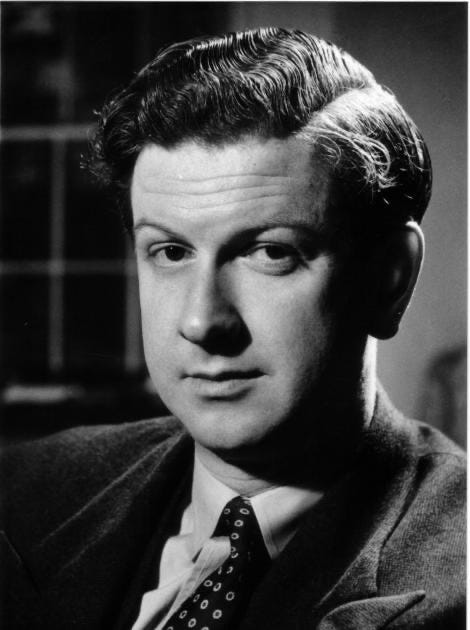"The Hours of Darkness" by Edmund Crispin
“So that’s that,” said Janice, absently twisting a sapphire ring on her finger. “Our old friend, the Closed Circle.”

It’s with a sigh of relief that I return to a classic country house mystery this week. (Don’t get me wrong, I loved my digression into gothic territory with Cat and Mouse, but the heart wants what the heart wants.) Edmund Crispin’s novella, published for the first time in the collection Bodies from the Library 2 in 2019, hits the proverbial sweet spot. We open on a game of hide and seek at a country house party. Louise Munro, a wealthy young widow and one of the houseguests, never returns from the game and is subsequently found brutally murdered in an alcove.
Gervase Fen, Oxford don and Crispin’s recurring amateur detective, is called in to lend a helping hand. He’s only too happy to do so, as it pulls him away from a children’s Christmas party being hosted at his house. That Fen solves the case for the police goes without saying, as does the fact that he annoys the officer in charge throughout.
If there is one glaringly inaccurate trope (just one? I can hear you murmur) that is indulged in over and over in mysteries, pushing our sense of disbelief to the breaking point, it is the jovial relationship that invariably springs up between amateur and professional detective. In this story, the Chief Constable calls Fen to ask for his help on Christmas Eve. No police officer, no matter how desperate, would ever allow a layperson the access routinely granted int he average detective novel.
This goes double for Fen, who, much to everyone’s dismay, spends the duration of the investigation singing Christmas carols (and getting the words wrong). As is often the case with novels featuring Fen, he’s not quite the main character, and though he solves the mystery, he is adjacent to the action, arriving after a lengthy description of the house party and its characters (particularly Noel and Janice, two young party goers and partial witnesses to the murder). Apparently the story first appeared as a radio broadcast in 1949, without Fen. Crispin adroitly inserted him into the investigative scenes, but his addition after the fact allows the other characters to shine (a little Fen goes a long way, in my opinion).
Particularly delightful are the would-be lovers, Noel and Janice. Crispin excels at depicting characters trying to be jaded and sophisticated — those would-be bright young things. Take, for example, this exchange between the two as they hide in the pool house during the game of hide and seek:
“They why don’t you make love to me?”
“Because” — the remark sounded a trifle priggish — “I just don’t make love to every pretty girl I happen to meet.”
“Why not?”she asked disconcertingly.
“I have principles,” Noel replied mendaciously. As a matter of fact he had none.
A short while later, Janice gets her kiss.
Noel found it a disturbingly pleasant kiss. Janice knew this, and he knew that she knew. The whole thing, he reflected, was distinctly a defeat for him.
When discussing alibis, the whole affair comes full circle, much to Fen’s horror:
“They were canoodling in a summer house.”
“Good God.” Fen was shocked. “In this weather?”
Fen shows off to the Inspector in classic style before finally cluing him in to the guilty party:
Wyndham sighed. “If only one knew which…” “Oh, I know,” said Gervase Fen blandly. “I was tolerably certain after that first interview with Noel and Janice, and everything since then has gone to confirm my suspicions.”
The Inspector takes it surprisingly well, as the Inspector always does in the Golden Age. Although it seems the good Inspector has also had his fill of the brilliant Fen:
“Well, I suppose you’d better go collect your man.”
“It’ll be a pleasure,” Wyndham murmured. “From almost every point of view, it’ll be a pleasure.”
Read with me
I publish on Tuesdays, alternating between short stories and novels.
Next week: The Benson Murder Case by S. S. Van Dine
In two weeks: “The Hunt Ball” by Freeman Wills Crofts
Murder in the Links
Looking for something completely different? Nine Puzzles, a Korean serial killer mystery just wrapped up its eleven episode run on Netflix. Serial killers are not usually my thing, but this isn’t particularly gory, and Son Suk-ku’s portrayal of a detective who loves classic English-language detective fiction is a delight.




